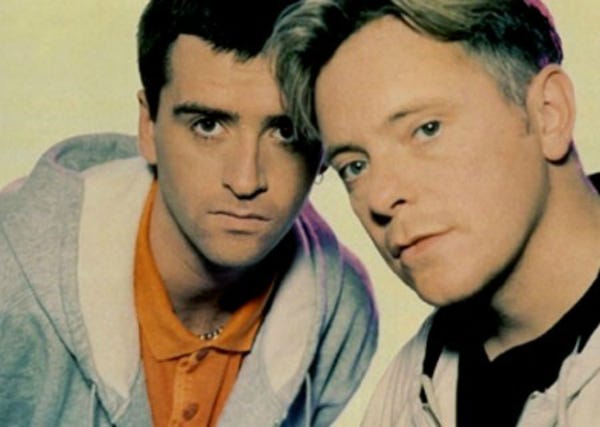Audio Autopsy, 1989: Electronic, "Getting Away With It": Bad Timing or Simply Overshadowed?
Squashed like a 1989 musical grape in the vise of the hair metal '80s and '90s flannel grunge? Or, has Electronic simply shrunk into the shadows of the "Duran Depeche" '80s hit-synth tidal wave?

For me to have gotten excited about a “synth-pop” band in 1989 took a bit of doing. At 34, I was busy doing a job in L.A. completely outside of the record biz I had enjoyed throughout the ‘70s and early ‘80s.
New music passing by my ear was exceedingly rare—I certainly didn’t seek it out, and I wasn’t about to listen to current AM (or FM, for that matter) “hit radio”! And, trips to the record store had gone from regular Tower Records/Sunset visits in the early ‘80s to occasional stops at Moby Disc in Anaheim, mainly to peruse their cut-out bins!
Spandau, ABC, and Scritti Politti: Synth Users Who Had Catchy Melodies, and Weren’t Afraid To Use Them
I don’t know how or where I first heard “Getting Away With It” by Electronic, but, like most “instant faves,” it was immediate. All I knew was that I had a new ‘80s-centric band to add to my other synthesizer-friendly acts of the decade: Scritti Politti, Spandau Ballet, and ABC.
The melody and harmonies (elements in the output of the 3 previously-mentioned bands) were instant grabbers, and I don’t even think I knew or cared about the members’ various and previous gigs! It matters of course, and in hindsight, it’s now clear how and why Electronic made the music they ended up making.
“I entered music at a poppy level.”
As Kevin Alexander noted in his recent article on the band’s 1992 single, “Disappointed”:
“The genesis for Electronic came when Bernard Sumner found himself frustrated that his New Order bandmates didn’t want to further venture into a synth-driven sound. But, he also found he didn’t like to work alone, and reached out to The Smiths’ Johnny Marr to collaborate.
“Neil Tennant of the Pet Shop Boys came on a short time later,” but in time to contribute to, and have “Getting Away With It” released, with all three (written by the trio, who also produced), a month before the dawn of 1990 in the UK, but not until March in the US. The single peaked at the 12th spot in the UK, but topped out at just #38 in the Billboard Hot 100. The band was signed to independent Factory Records in the UK, and Warner Bros. in the states.
Curiously, it took a full year-and-a-half for the band’s first album to be released, and that was after the single had sold a quarter-of-a-million copies in the UK!
The Influence of One
The first single Sumner ever bought, according to GQ Magazine/UK in 2012, was “Ride A White Swan” by T. Rex. “I'd heard it on the radio, and I liked the sound of the guitar - that lovely guitar lick,” he recalls. “It's a great track, but it's always puzzled me what the bloody lyrics are about. I've been scratching my head ever since I bought it, but it's a cool track. I entered music at a poppy level.”
I submit he left New Order less because the band balked at a “synth-driven sound,” but that they didn’t want to do it in a melodic direction Sumner favored. Submitted for your approval:
The Song
“Getting Away with It” features Tennant sharing background vocals, as Sumner takes the lead. Marr plays guitar, and offers a unique finger-picking solo on Spanish guitar. The song speaks to the question implied by its title, according to Wayne Studer of Geowayne.com:
“Just what is it that the narrator has supposedly been ‘getting away with’ all his life? The litany of activities described in the lyrics seems to boil down to the narrator thinking and doing things that only serve to hurt and torment himself”….
Editor’s note to the preceding: A common and stereotypical “trend” of many, if not most, of the self-loathing, introspective “navel-gazers” seemingly dotting the ‘80s synth-infused landscape (generally speaking), exemplified by the black-trenchcoated Cure, Smiths, and to a large extent, Depeche Mode, and others.
“This self-destructive tendency,” Studer asserts, “is most notably manifested in the refrain: ‘However I look, it's clear to see that I love you more than you love me.’ But, he's not about to give up on it; after all, he has been ‘getting away with it,’ so why should he stop?
“He clearly derives even more pleasure than pain from his behavior. As long as he can keep getting away with it, he'll keep doing it. And, who knows? — Maybe eventually his love will be returned in full.”
In 1989, and with a couple of decades of conditioning from my relationships under my belt, that resultant and enviable successful outcome would never have occurred to me. So, along with the beautiful string arrangement (arranged and conducted by Anne Dudley, who did the same for ABC and their 1982 Lexicon of Love album, earning songwriting credits on some tracks) and catchy chorus melody, I’m certain Sumner’s and Tennant’s lyrics had a recognizable appeal to my cynical, lovelorn self at the time.
Morrissey Could Use a Hug; Maybe a Band-Aid
In fact, I’d love to believe Sumner’s nose-wipe (at the 1:48 mark) and eye-dab (3:38) were due more from twinges of the familiarity of a broken heart, and not from just an itch. “I’m with ya, Barney, and we’ll meet for a commiserating couple of Imperial Stouts after!”
Tennant has provided some fascinating background information, according to Studer: “He and Sumner wrote the lyrics from the presumed perspective of former Smiths lead singer […and Marr's former writing partner, and the virtually self-appointed ‘King of Navel-Gazing’] Morrissey, suggesting that he's been ‘getting away with’ his ‘persona of being miserable’ for years” [made manifest in the 1990 song by Tennant’s Pet Shop Boys—hilariously, I might add—”Miserablism”].
So perpetually miserable to the point of self-parody is Mo (at least in his recording/rock star persona), it’s been rumored a good friend once approached him and exclaimed, “Oh, hey, Mo…I didn’t recognize you with your wrist closed!”
Parody or Parity? Neil Tennant, Slyer Than He Had to Be!

Studer: “Marr has suggested that Tennant actually had greater input into the lyrics than Sumner, which Neil has subsequently confirmed in interviews: ‘They had the track but they didn't have any words, and I thought of 'getting away with it.'
“My idea for the lyric of the song was that I was being Morrissey!” Chalk up another one for Neil: On top of everything else, becoming a “back-door” Weird Al!
Electronic’s follow-up single to “Getting Away With It” was “Get the Message,” released in 1991. It reached #8 in the UK, and didn’t chart in the US. Another well-crafted pop song, it’s well worth the listen:





I didn't know that Neil Tennant wrote most of these lyrics but I love the idea of him doing a catty Morrissey impression. That cracks me up!
Great, another song to I-can’t-live-without-it playlist!😊